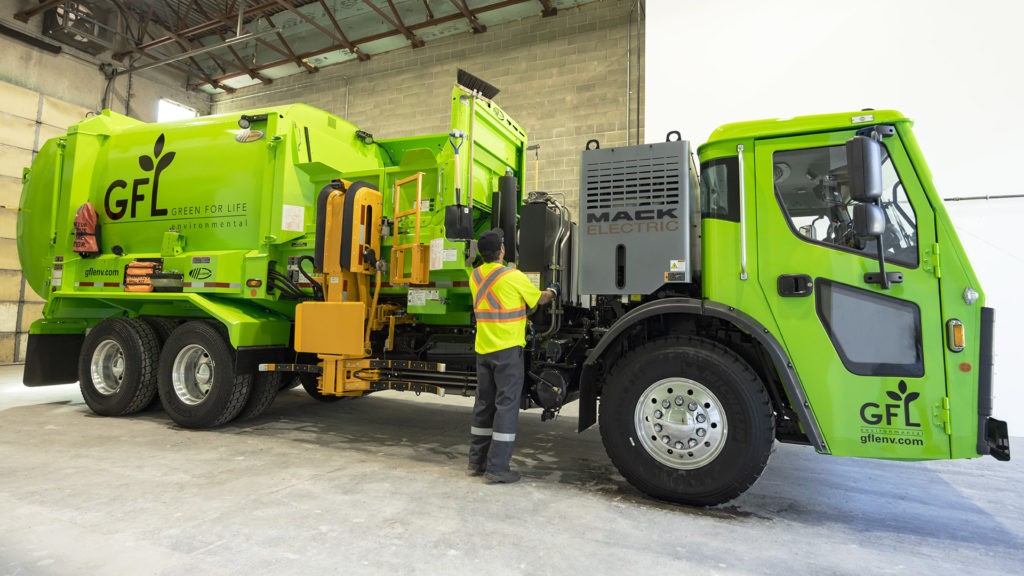GFL pilots electric side loader
The loader will be put through its paces collecting waste in Squamish, B.C.

Crews prep an electric automatic side loader used for waste collection. – GFL Environmental
Key Takeaways:
- The company will access the vehicle’s performance in Squamish, B.C.
- It is part of GFL’s goal to reduce greenhouse gas emissions in its fleet.
- The company has already switched 15 per cent of its fleet over to cleaner fuels.
The Whole Story
GFL Environmental, a North American environmental services company, has introduced its first first fully electric automated side loader (ASL) truck, in B.C.
The vehicle has already been on a long journey. Its chassis was built at Mack Trucks in Pennsylvania; its body was mounted at Labrie Automizer in Quebec; and from there it attended Waste Expo in Las Vegas. Now, the truck has moved to its new permanent home in Squamish.
The company explained that Squamish is a perfect place for GFL to introduce an electric truck. The district of Squamish declared a climate emergency in 2019 and is actively working towards creating a low-carbon future. Decarbonizing transportation is one strategy being adopted to reduce emissions.
“Environmentalism is appreciated in the natural beauty of Squamish and the District of Squamish has been quite vocal on electrical adoption,” said Tyler Stefure, GFL’s fleet director for Western Canada. “They have expressed interest in seeing what a private hauler can do. I think this truck will get a lot of attention for us in Squamish.”
The new truck operates with a near-silent powertrain, providing quiet service to the residents on its route. The truck produces no exhaust emissions and requires no oil changes. It will be charged overnight so it’s ready to tackle its route the next day.
Denise Imbeau, general manager of GFL’s Squamish facility, added that the area is a huge draw for outdoor enthusiasts, including skiers, mountain climbers, mountain bikers and windsurfers.
“Our community is very eco-minded, innovative and forward thinking,” Imbeau said. “Investment in electric technology aligns with the values of this community and demonstrates the commitment GFL has to our community and our planet.”
GFL stated that one of its key sustainability objectives is to continue to reduce GHG emissions from operations and increase the use of alternative and low-carbon fuels in its fleet. The company has already switched 15 per cent its collection fleet over to compressed natural gas (CNG) fuel.
“The electric truck is intended to do everything that its gas and diesel counterparts can do,” Stefure said. “Obviously, battery life is influential so as time goes on, we’ll really put it through its paces and see how it does.”
GFL’s plan is to first learn how to safely operate and care for the truck, then to test it in a variety of situations to figure out what limitations, if any, need to be considered.
“There’s a lot of speculation on what the truck should do. The proof is in what it can do, and that’s why BC is such a great proving ground for us,” Stefure said. “It offers different climates and different terrains, so we can run the truck in Squamish and maybe run it in the Lower Mainland or someplace really cold, just to find out how it performs.”
